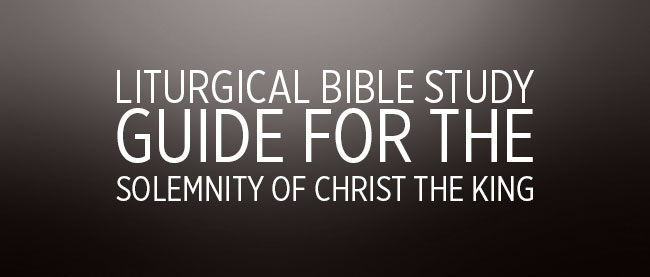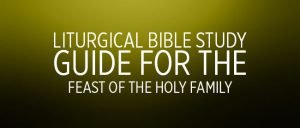Introduction
Instituted by Pope Pius XI in 1926, this feast was celebrated on the last Sunday of October to foster the awareness of Christ’s dominion over all people and to establish peace among nations. After Vatican Council II, the feast was transferred to the last Sunday of the Liturgical Year, the Sunday before Advent, on which the human race is consecrated to the Sacred Heart through the Litany of the Sacred Heart and a prayer recited before the Blessed Sacrament.
This feast celebrates Christ’s Kingship in an altogether non-worldly way. Jesus was anointed by the Father with the oil of gladness as the Eternal Priest and Universal King. As Priest He offered His life on the altar of the Cross and redeemed the human race by this one perfect sacrifice of peace. As King He claims dominion over all creation that He may present to the almighty Father a Kingdom of truth and life, a Kingdom of holiness and grace, a Kingdom of justice, love, and peace.
1st Reading – 2 Samuel 5:1-3 (this same reading can also be found in 1 Chronicles 11:1-5)
The main purpose of 1 and 2 Samuel is to provide a history of the foundation of the kingdom of Israel and the settlement of the throne on David and his line. In the chronology of events, those portrayed in the book of Judges immediately precede those recounted in the books of Samuel. At the end of Judges, the people saw a monarchy as the only way out of a situation of internal strife and anarchy. Outside enemies had been reduced to one, the Philistines, who were established along the Mediterranean coast; but the Philistines were so formidable and expansionist that the very survival of Israel seemed to be at stake and the tribes really needed to combine forces.
Samuel, who is regarded as the last of the judges, was the man chosen to bring about this unification. God used him to make Saul the first king of Israel. Everything connected with this choice of Saul, as with later events resulting from it, shows that God is still with His people; He is going to bring them to new political and military heights. The Philistines (descended from Egypt, son of Ham, son of Noah) are defeated, though not brought under total control. Like the Ammonites (descended from Ammon who was the result of the incestuous union of Lot and his younger daughter), Moabites (descended from Moab who was the result of the incestuous union of Lot and his older daughter), Edomites [(red) descended from Esau], and Aramites (descended from Shem), they become tributaries of Israel. This whole campaign was brought to a conclusion during the reign of David, whose vassal even the king of Tyre became. The effect of all this is that all Transjordan came to be dominated by David. Our reading today is of the anointing of David as king of Israel. David was 30 years old and reigned for 40 years.
2nd Reading – Colossians 1:12-20
In Paul’s time Colossae was a small city in Asia Minor, situated in a region called Phrygia, in a valley of the Lycus River. Located in the same valley were Laodicea, about nine miles to the northeast; and Hierapolis, twelve miles to the North. This whole area is part of modern day Turkey. All that remains of Colossae today are some unimportant ruins.
Most of the inhabitants of the city, and in fact the whole region, were Gentiles, although Josephus tells us that Antiochus III “The Great” (223-187 B.C.) decided to transport 2000 Jewish families from Babylonia to Lydia and Phrygia. Acts 2:10 tells us that residents of Phrygia were among the Jews who heard Peter’s address in Jerusalem on the day of Pentecost.
Paul himself was not the founder of the Christian community of Colossae. Epaphras, a Colossian who had been converted by Paul at Ephesus, had brought the faith to Colossae and probably Laodicea and Hierapolis as well.
While he was imprisoned in Rome, Paul was visited by Epaphras who reported on the dangerous doctrinal tendencies of some local teachers. These teachings were the product of both Jewish and pagan influences. Basic to them was the belief that certain angelic beings had control over human affairs, and even over all creation. It had then become a primary concern to acquire a “knowledge” of these super beings and their workings in order to appease them. This type of belief jeopardized the position of Christ, who might be considered as one of, even if the most powerful of, many mediators between God and the universe. Paul had to confront these errors vigorously and point out clearly Christ’s unique place and all-powerful cosmic role in the universe.
The Jewish influence in the attempt to combine and resolve beliefs is evident in the references to observing suggested days, seasons, circumcision, and other Jewish practices. In some circles of Judaism there was a strong belief in the mediatorship and power of the angels.
Paul had to counter these dangerous tendencies by pointing out the all-sufficiency of Christ in His role in the universe. He had to point out that the fullness of the godhead was not shared by a multitude of intermediaries; all the fullness of God and His power was in Christ Himself. By His death on the cross, Christ had won a victory over all the forces that were considered to control the universe.
Bible Study guide from Fr. Cielo Almazan





